People like us
Alan Judd
‘Good neighbours I have had, and I have met with bad; and in trust I have found treason.’ Thus spake Elizabeth I, that font of pithy regal eloquence who learnt such worldly wisdom without buying or selling a single car. (If she had, her merry quip — ‘I will make you shorter by the head’ — might have been deployed more frequently.) It’s usually easier to buy cars than sell them, of course, but it’s still an anxious process. Most of us like to think we’re getting at least what — if not more than — we’re paying for, and fear we’re getting less. Yet we live in a buyer’s market and have never had more for our money, new or secondhand, than now. Previously, nearly everyone bought from the local classifieds and dealers, but now car supersites such as Cargiant (www.cargiant.com) offer huge choice and good value. They have also helped drive down prices in the more traditional markets, which is partly why the locals still survive.
It’s partly also because many people want to drive a car before they buy it. They hope to spend a lot of time in it and if the seat is uncomfortable, windscreen reflections intrusive, the pedals awkwardly angled or the ‘feel’ simply wrong, then you want to know that before putting your hand in your pocket. But it’s partly, too, because to an extent we judge what we’re buying by who is selling. This is particularly the case with things that need maintenance in order to keep going. And if we’re selling something that means people calling at the house, we worry about who they are. What this amounts to is that many people prefer to buy and sell to people they judge to be people like themselves. People like us.
It’s not infallible, of course. I’ve bought good cars from honest men in sink council estates and overpriced rubbish from Philip Larkin’s ‘shit in the shuttered chateau’. The seams of human vices, like human virtues, run throughout mankind. It’s not really a question of wealth or status or class, but of values; most of us want to deal with people who share, however superfi cially, the values to which we also aspire i.e., who are reasonably honest, seek a reasonable deal and don’t write rubber cheques. And we feel that much safer if we know that those with whom we deal would be shamed if caught out acting in bad faith.
I don’t know whether such thoughts played a part in the recent launch of a new website, www.schoolstrader.com, or whether it was simply an inspired realisation of a ready-made market waiting to be born. Whichever — and it was probably both — it is certainly working.
It began as a kind of virtual shop window for the parents of children at three independent schools who wished to buy and sell baby clothes, toys, uniforms, books, computers, garden furniture, unwanted presents and whatever. It now features about a thousand schools including Benenden, Haileybury, Thomas’s and St Leonards Mayfield, advertising everything from jobs, houses and holiday lets to Italian lessons, farm equipment, horses, a gypsy caravan and, of course, cars. Parents, teachers, friends and family can choose whether to advertise nationally or among local schools only. And it’s free. Not surprisingly, it’s growing fast as our old friend Word of Mouth goes to work around parental dinner tables. Given the market you’re dealing with, there’s a fair bit of money available which, in car terms, translates into some appealing metal.
I liked the pretty 1935 Austin 7 in racing green at £6,000, and would like the yearold Aston Martin V8 Vantage (black, 7,000 miles, a useable everyday supercar) but they’d have to sharpen their pencils on the asking price of £75,000. The 2003 Volvo XC90 D5 sounds expensive at £17,000, but they are, and you can easily pay more. The 2004 Ford Mondeo Zetec TDCi 130 estate, however, is a good car in anybody’s money (reliable, reasonable maintenance, six feet of load space and up to 50mpg); at £6,500 ono you shouldn’t go wrong. If it makes you feel safer, haggle and spend the difference on an extended warranty from Warranty Direct. Or you could forget the family and go for a classic Triumph TR6 at £9,850. Or, more exotic still, the TR4 rally car at a thought-provoking £28,000. And there’s a predictable spattering of 4WDs.
One thing you won’t be able to buy there — at least, not for a while — is Aston Martin itself. Ford has now accepted £479 million from a consortium largely owned by two Kuwaiti investors who are also part-owners of London’s Grosvenor House. They’re making the right noises more investment for new models and more of the charismatic and capable chief executive, Dr Ulrich Bez. And they’ll definitely build the Rapide, the four-door sports coupe first displayed at Geneva last year. A thing of grace and beauty, it is one of those rare cars the image of which stays with you long after you’ve seen it. Dr Bez’s engineering background with Porsche should help it go a bit, too.



















































































 Previous page
Previous page